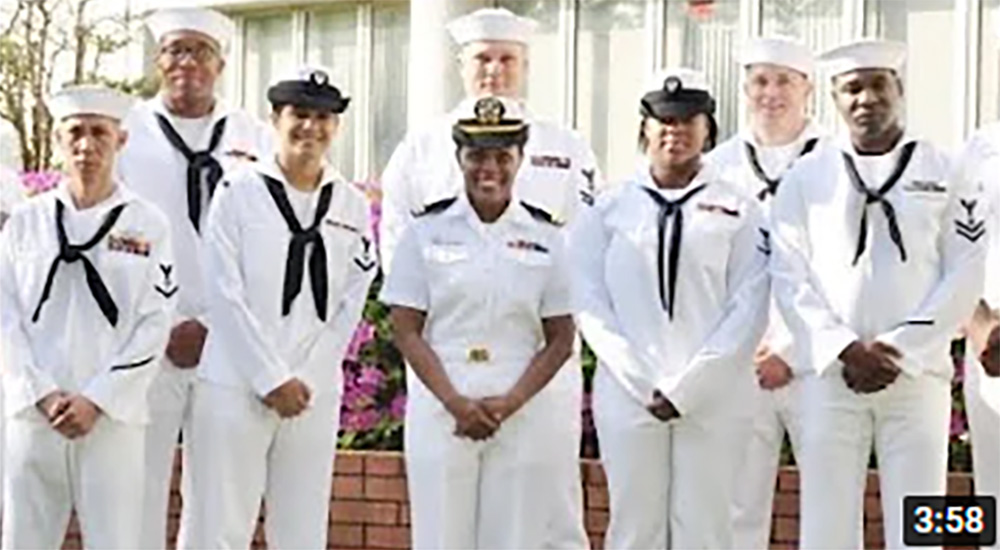Navy Veteran Tammy D’Alesandro was struggling. “I’m not ashamed to say I was in a really bad place. There were days I didn’t want to be here anymore because I didn’t know who I was,” she recalled. “That was hard.”
Then D’Alesandro was referred to VA’s Whole Health program. It changed the course of her life. “I learned about the Whole Health program through my primary care provider. I was looking for ways to try to take back control of my life after the military.”
In this episode of #VADidThat, we learn about Whole Health, VA’s approach to care that supports the entire health and well-being of Veterans and employees. By centering care on what matters most for Veterans, Whole Health allows each person to discover their own mission, aspiration and purpose, which ultimately drives their commitment to health and wellness.
“The model provides Veterans with instruction on self-care and skill building, while providing support that seamlessly integrates into other health care aspects at VA,” said Kathy Bixby, Whole Health nurse educator and Veteran at the Washington D.C. VA.
Significant decrease in opioid use
Bixby says Whole Health has been shown to impact Veterans facing opioid addiction. “One of the most significant outcomes is a decrease in use of opioids by Veterans who have participated, between 23 and 38 percent, depending on which aspects of Whole Health Veterans are using.”
Many factors can influence a Veteran’s health including gender, culture, language preferences and other characteristics that make each Veteran unique. Whole Health takes these factors into account and then helps Veterans determine their own health and wellness goals.
“Even though it’s not a typical health outcome, I’d say hope drives everything for me regarding my health. And the Whole Health model gave me hope,” said D’Alesandro. “This program, and the hope it gave me, saved my life. And I actually made a promise to myself that I would share my own story of healing and triumph in the hopes that it would save someone else’s life, too.”
Hear the rest of D’Alesandro’s story here.
To learn more, visit www.va.gov/wholehealth.
Topics in this story
More Stories
The Medical Foster Home program offers Veterans an alternative to nursing homes.
Watch the Under Secretary for Health and a panel of experts discuss VA Health Connect tele-emergency care.
The 2024 National Veteran Suicide Prevention Annual Report provides the foundation for VA’s suicide prevention programs and initiatives.







I have a question that I can not get a straight answer to. My brother is a veteran as am I. He had a brain bleed followed by a stroke which he survived but is bound to a bed for the rest of his life. But it doesn’t have to be that way. He is on Hospice they have sealed his fate by not trying to help him in any way. They in essence just put a clock on him. The doctor had never even seen him or talked to us not one time. These are not VA doctors. But we cannot move him he requires 24 hour care. I hear that there is programs through the VA that could help him. But we can’t get him to the VA hospital and they won’t come see him. He doesn’t have to die like this. But no one will bend an inch to see if they can help because it is not cost efficient. The VA will not even prescribe the insulin he needs to live being a type 1 diabetic because he can’t come to the hospital to see a doctor. I have exhausted every thing I know to do. It’s a catch 22 situation and we are left watch my brother die a slow painful death. And it doesn’t have to be.
Funny how you see all these articles talking about how wonderful the VA is and yet we don’t see any how VA hospitals have turned away veteran’s having suffering mental crisis’, or how community care has completely ignored referrals from primary care to set appointments for chiropractic care, etc. Yet nothing gets scheduled and veteran’s are waiting months for appointments.
No real information in this article. The VA is making their interns rich while Veterans are going bankrupt and homeless. The interns do exactly nothing for the Veterans.
There is no real information given in this article. Why doesn’t the VA talk about how their use of interns take advantage of the Veterans. Veterans are going bankrupt and homeless while the interns are making thousands of dollars.
[Editor: You can learn more about our unpaid student interns, here: https://vsfs.state.gov/ and here: https://www.dmeinterns.org/ ]
So why won’t the VA allow us to tell the rear truth about the VHA?? Why do they keep hiding the true facts??? Our statements should be published here as well, the VA has major problems it refuses to address to us, the Veteran. Try telling the real truth!! Stop the lies!!!